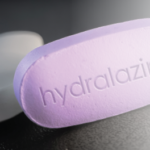Approximately one year from last exposure to TNF-alpha inhibitors, our patient presented with severe arthritis, nonspecific complaints and renal insufficiency accompanied by nephrotic range proteinuria without hematuria. Serologically, she was positive for ANA, anti-histone and SSA/SSB antibodies, but negative for dsDNA or cryoglobulinemia.
In this scenario, hypocomplementemia was suggestive of accelerated consumption by immune complex formation. The renal biopsy confirmed our suspicion of ongoing autoimmune process, demonstrating immune-complex deposition MPGN.
The challenge of this case was the patient’s previous exposure to hydralazine, a drug known to induce lupus; however, our patient did not present any of the classic signs of lupus, and her renal biopsy was not consistent with lupus nephritis; staining for C1q deposition was negative.8
Drug-induced glomerulopathies are most likely immune mediated, & they can present with a nephritic or nephrotic syndrome.
Rituximab, a monoclonal antibody to the CD20 antigen on B cells, was approved in 2007 for RA patients who failed DMARDs and TNF-alpha inhibitors. Additionally, in 2011, it was approved for ANCA vasculitis (RAVE trial), because it demonstrated non-inferiority to cyclophosphamide in patients with renal involvement.12,13 It is also used off-label in many immune-mediated GN cases, including lupus nephritis, membranous nephropathy, mixed cryoglobulinemia, minimal disease or focal segmental glomerulosclerosis given its efficacy, tolerability and safety profile.14
Our patient was started on Rituximab, with significant improvement in her arthritis symptoms and renal function.
Conclusion
This is a case of a long-term, poorly controlled RA, with exposure to multiple TNF-inhibitors that developed late-onset immune complex-mediated membrano-proliferative glomerulonephritis. Treatment with high-dose pulse steroids and Rituximab resulted in significant improvement of the patient’s renal function and reduction of proteinuria.
 Diana M. Girnita, MD, PhD, is a rheumatology fellow at the University of Cincinnati in the Department of Immunology, Allergy and Rheumatology.
Diana M. Girnita, MD, PhD, is a rheumatology fellow at the University of Cincinnati in the Department of Immunology, Allergy and Rheumatology.
Shahzad Safdar, MD, is a nephrologist at The Christ Hospital in Cincinnati. He specializes in electrolyte abnormalities, hypertension, kidney stones, chronic kidney disease, dialysis, glomerulonephritis including lupus nephritis and other connective tissue-related renal diseases. He has been an attending nephrologist at The Christ Hospital since 1998.
Avis Ware, MD, is a professor of medicine at the University of Cincinnati in the Department of Immunology, Allergy and Rheumatology. She is board certified in both internal medicine and rheumatology. Her research interests lie in general rheumatology and integrative medicine.
References
- Helin HJ, Korpela MM, Mustonen JT, Pasternack AI. Renal biopsy findings and clinicopathologic correlations in rheumatoid arthritis. Arthritis Rheum. 1995 Feb;38(2):242–247.
- Pruzanski W. Renal amyloidosis in rheumatoid arthritis. J Rheumatol. 2007 Apr;34(4):889; author reply 889.
- Perez-Alvarez R, Pérez-de-Lis M, Ramos-Casals M, BIOGEAS study group. Biologics-induced autoimmune diseases. Curr Opin Rheumatol. 2013 Jan;25(1):56–64.
- Costa MF, Said NR, Zimmermann B. Drug-induced lupus due to anti-tumor necrosis factor alpha agents. Semin Arthritis Rheum. 2008 Jun;37(6):381–387.
- Stokes MB, Foster K, Markowitz GS, et al. Development of glomerulonephritis during anti-TNF-alpha therapy for rheumatoid arthritis. Nephrol Dial Transplant Off Publ Eur Dial Transpl Assoc—Eur Ren Assoc. 2005 Jul;20(7):1400–1406.
- Kronbichler A, Mayer G. Renal involvement in autoimmune connective tissue diseases. BMC Med. 2013 Apr 4;11:95.
- Izzedine H, Launay-Vacher V, Bourry E, et al. Drug-induced glomerulopathies. Expert Opin Drug Saf. 2006 Jan;5(1):95–106.
- Xiao X, Chang C. Diagnosis and classification of drug-induced autoimmunity (DIA). J Autoimmun. 2014 Feb–Mar;48–49:66–72.
- Clancy RM, Backer CB, Yin X, et al. Genetic association of cutaneous neonatal lupus with HLA class II and tumor necrosis factor alpha: Implications for pathogenesis. Arthritis Rheum. 2004 Aug;50(8):2598–2603.
- Piga M, Chessa E, Ibba V, et al. Biologics-induced autoimmune renal disorders in chronic inflammatory rheumatic diseases: Systematic literature review and analysis of a monocentric cohort. Autoimmun Rev. 2014 Aug;13(8):873–879.
- Ramos-Casals M, Brito-Zerón P, Muñoz S, et al. Autoimmune diseases induced by TNF-targeted therapies: analysis of 233 cases. Medicine (Baltimore). 2007 Jul;86(4):242–251.
- Geetha D, Specks U, Stone JH, et al. Rituximab versus cyclophosphamide for ANCA-associated vasculitis with renal involvement. J Am Soc Nephrol JASN. 2015 Apr;26(4):976–985.
- Stone JH, Merkel PA, Spiera R, et al. Rituximab versus cyclophosphamide for ANCA-associated vasculitis. N Engl J Med. 2010 Jul 15;363(3):221–232.
- Kattah AG, Fervenza FC, Roccatello D. Rituximab-based novel strategies for the treatment of immune-mediated glomerular diseases. Autoimmun Rev. 2013 Jun;12(8):854–859.

